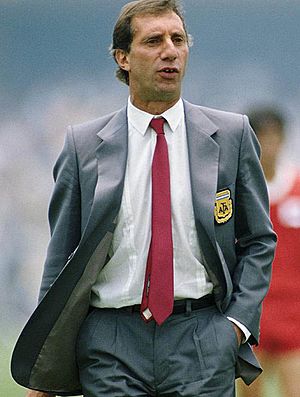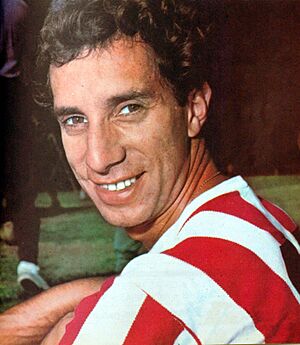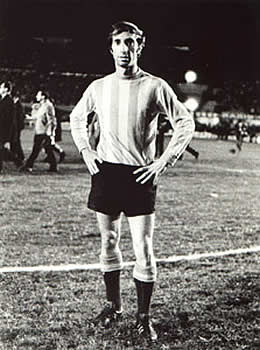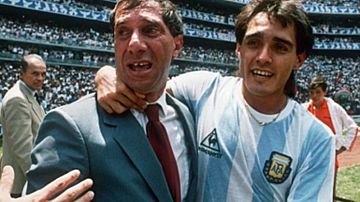Carlos Bilardo facts for kids

Bilardo as Argentina's manager during the 1986 World Cup
|
|||||||||||||||||||
| Personal information | |||||||||||||||||||
|---|---|---|---|---|---|---|---|---|---|---|---|---|---|---|---|---|---|---|---|
| Full name | Carlos Salvador Bilardo | ||||||||||||||||||
| Date of birth | 16 March 1938 | ||||||||||||||||||
| Place of birth | Buenos Aires, Argentina | ||||||||||||||||||
| Height | 1.74 m (5 ft 9 in) | ||||||||||||||||||
| Position(s) | Midfielder | ||||||||||||||||||
| Youth career | |||||||||||||||||||
| San Lorenzo de Almagro | |||||||||||||||||||
| Senior career* | |||||||||||||||||||
| Years | Team | Apps | (Gls) | ||||||||||||||||
| 1958–1960 | San Lorenzo | 174 | (12) | ||||||||||||||||
| 1961–1965 | Deportivo Español | 111 | (39) | ||||||||||||||||
| 1965–1970 | Estudiantes | 175 | (11) | ||||||||||||||||
| Total | 460 | (62) | |||||||||||||||||
| International career | |||||||||||||||||||
| 1959 | Argentina youth | ||||||||||||||||||
| Managerial career | |||||||||||||||||||
| 1971 | Estudiantes | ||||||||||||||||||
| 1973–1976 | Estudiantes | ||||||||||||||||||
| 1976–1978 | Deportivo Cali | ||||||||||||||||||
| 1979 | San Lorenzo | ||||||||||||||||||
| 1979–1981 | Colombia | ||||||||||||||||||
| 1982–1983 | Estudiantes | ||||||||||||||||||
| 1983–1990 | Argentina | ||||||||||||||||||
| 1992–1993 | Sevilla FC | ||||||||||||||||||
| 1996 | Boca Juniors | ||||||||||||||||||
| 1998 | Guatemala | ||||||||||||||||||
| 1999–2000 | Libya | ||||||||||||||||||
| 2003–2004 | Estudiantes | ||||||||||||||||||
|
Medal record
|
|||||||||||||||||||
| *Club domestic league appearances and goals | |||||||||||||||||||
Dr. Carlos Salvador Bilardo (born March 16, 1938) is a famous Argentine former doctor, football player, and manager. He is known for his smart strategies in football.
Bilardo became very well known as a player with Estudiantes de La Plata in the 1960s. He then became even more famous as the manager of the Argentina team. He led them to win the 1986 FIFA World Cup and almost won it again in 1990, where they reached the final match. As Argentina's manager, he was famous for using a special team setup called the 3–5–2 formation. This formation has been used for many years but is not always common.
Fans and the media often call Bilardo el narigón, which means "the big nosed one."
Contents
Early Life and Studies
Carlos Bilardo was born in the La Paternal neighborhood of Buenos Aires, Argentina. His parents were immigrants from Sicily. From a young age, he loved football. However, he also made sure to study hard and work. During school breaks, he would wake up very early to help carry food to the Abasto market in Buenos Aires.
Bilardo showed great promise in the youth teams of a big Buenos Aires club called San Lorenzo de Almagro. He was chosen to play for the junior Argentina national football team. This team won the Pan-American title in 1959 and played in the 1960 Summer Olympic Games in Rome.
In 1961, Bilardo moved to Deportivo Español, a team in the second division. He became the top scorer for that team. Over time, he started playing more as a defensive midfielder. At the same time, he continued his studies at the Faculty of Medicine at the University of Buenos Aires.
Playing Career Highlights

In 1965, Bilardo joined Estudiantes de La Plata. The team's manager, Osvaldo Zubeldía, wanted Bilardo to be a strong leader in the middle of the field. He was part of a group of talented young players known as la tercera que mata (the killer youth divisions).
Bilardo became the team's main strategist on the field. Over four years, Estudiantes won several important titles. They won one Metropolitano title in 1967. They also won the Copa Libertadores three times in a row (1968, 1969, and 1970). They beat teams like Palmeiras, Nacional, and Peñarol in the finals. In 1968, they also won the Intercontinental Cup against Manchester United.
After finishing his medical studies, Bilardo stopped playing football. He became the coach for Estudiantes in 1971. For several years, he balanced coaching, spending time with his family, and helping with his father's furniture business. He even did some medical research and worked as a gynecologist. Bilardo eventually stopped practicing medicine in 1976. He felt that being a doctor needed full-time attention, which he could not give.
Managerial Career
After his playing days, Bilardo started coaching Estudiantes in 1971. His team reached the final of the 1971 Copa Libertadores but lost to Nacional. In 1976, he became the manager of Colombia's Deportivo Cali. After two years, he led them to the 1978 Copa Libertadores Finals, but they did not win the title.
After this, Bilardo had a short time coaching San Lorenzo. Then, he became the coach of the Colombia national team. When the team did not qualify for the 1982 World Cup, he was let go. Estudiantes then arranged for him to return to Argentina.
Return to Estudiantes and National Team Role
Estudiantes had a good financial situation because they had sold a player named Patricio Hernández. This allowed them to get the new players Bilardo wanted. The team reached the semi-finals of the 1982 Nacional tournament. They then went on to win the Metropolitano title that same year.
Bilardo's coaching style was based on the tactics of his former manager, Zubeldía. His team was very strong in attack, with players like Sabella, Trobbiani, Gottardi, and Ponce. Their success caught the attention of the Argentine Football Association. They offered him the job to manage the Argentina national team.
He was the national team coach from 1983 until after the 1990 World Cup. Under his leadership, Diego Maradona became one of the best players in the world. Argentina had its most successful international period. They won the 1986 World Cup and reached the final in 1990.
Bilardo wrote a book called "Así Ganamos" ("How We Won"). It tells the story of Argentina's victory in the 1986 FIFA World Cup.
After the 1990 World Cup
After 1990, Bilardo worked as a teacher and journalist, while also continuing to manage teams. He worked again with Diego Maradona at Sevilla FC and later at Boca Juniors. He also had a short time as the national coach for Libya.
Bilardo returned to coach Estudiantes for the 2003–2004 season. During one game against Club Atlético River Plate, he was seen drinking from a bottle. When asked by the media, he said it was Gatorade. A lab test confirmed he was telling the truth. That season, the team's results got better. Several young players, like José Ernesto Sosa, became important for the team. Three years later, Estudiantes won the league title under coach Diego Simeone. In 2009, Estudiantes won the Copa Libertadores again. Bilardo was there for the final and received a special gift from coach Sabella: his "lucky" beige coat.
Bilardo worked as a commentator for Argentine TV station Canal 13 during the 2006 FIFA World Cup in Germany. After the tournament, the Argentine manager José Pekerman left his job. Bilardo's name was mentioned as a possible replacement. However, the job went to Alfio Basile, who had also taken over from Bilardo after the 1990 World Cup.
After the 2007 election for governor, Bilardo was named Secretary of Sports for Buenos Aires province. He worked under Governor Daniel Scioli.
General Manager Role
Many coaches who were influenced by Bilardo have taken important roles in football in Argentina and South America. These include Brown, Pumpido, Burruchaga, Batista, Russo, and Maradona.
When Diego Maradona was chosen as the national team coach in October 2008, Bilardo was selected to be Argentina's General Manager. After taking this new role, Bilardo left his position as Secretary of Sports.
Achievements and Awards
As a Player
- Primera División: 1959
- Primera División: 1967 Metropolitano
- Copa Libertadores: 1968, 1969, 1970
- Intercontinental Cup: 1968
- Copa Interamericana: 1968
- Pan American Games Gold Medal: 1959
As a Manager
- Primera División: 1982 Metropolitano
- Categoría Primera A runner-up: 1977, 1978
- Copa Libertadores runner-up: 1978
- FIFA World Cup: 1986; runner-up: 1990
- Copa América Third place: 1989
Individual Awards
- Guerin Sportivo Manager of the Year: 1986
- South American Coach of the Year: 1986, 1987
- Konex Award: 1990
- World Soccer 29th Greatest Manager of All Time: 2013
See also
 In Spanish: Carlos Bilardo para niños
In Spanish: Carlos Bilardo para niños



